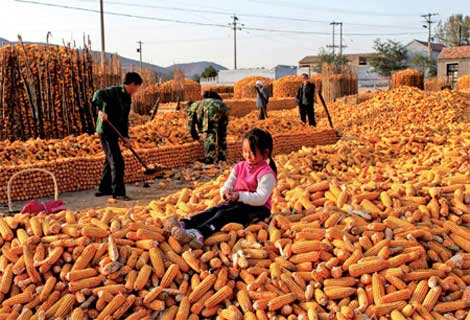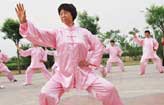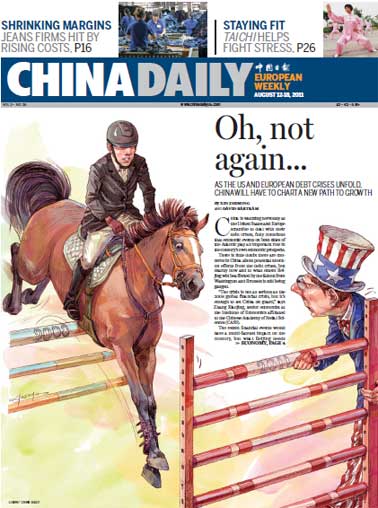Sowing the seeds of doubt
Updated: 2011-08-05 11:13
By Zhou Siyu (China Daily European Weekly)
 |
|
Farmers harvest corn in Xiyang, Shanxi province. In recent years, Shanxi has boasted the largest sales of Pioneer's corn seeds in China. Bai Ying / for China Daily |
The presence in China of multinationals such as Monsanto and Pioneer is sparking controversy
Zhang Yingquan always keeps his shop neat and tidy to allow as many people as possible to congregate there. Half a dozen blue plastic stools, accompanied by a large green thermo-jug, form a convenient resting area at the far end of the counter. Every spring, a bevy of villagers used to sit there exchanging country gossip for entire afternoons at a time. This year, however, the shop has been empty and quiet. Zhang is a 32-year-old farmer in Shitie county, Shanxi province, the heartland of China. Along with his wife, he runs a franchised seed shop for Pioneer Hi-Bred International Inc, a subsidiary of DuPont de Nemours & Co. "Sales this year are little more than half those of last year," Zhang says bitterly.
In recent years, Shanxi has boasted the largest sales of Pioneer's corn seeds in China, but in Shitie and neighboring Dongzhao counties things are different.
Zhao Zhicheng, one of the company's distributors who works in Dongzhao, a 45-minute drive from Zhang's shop, says he has experienced the same problem, but on a larger scale.
What has dampened their sales is the large volume of counterfeit seeds (produced by another company, but marketed as those of one of the majors) in the market. "I have never seen so many fake seeds before," Zhao says.
"This year, the market has seen more counterfeit seeds than in the past," says Wei Yuejin, director of the local seed-control office, which is affiliated with the provincial agricultural bureau and established at all government levels.
Together they regulate the seed market, oversee quality and provide farmers with technical support.
The flood of fake seeds is by no means a local problem. An estimated 8,700 seed companies are operating in the Chinese market, but fewer than 100 have their own intellectual property rights.
More than 90 percent of the companies are small- and medium-sized enterprises (SMEs) and have lower levels of research and technology. Around 30 percent of them are engaged in producing and selling counterfeit seeds every year, according to industry reports.
China's vast seed market has long been in need of greater regulation, and there's every sign that the government will push for consolidation in the industry to improve the situation.
In October 2010, the Ministry of Agriculture raised the registration threshold for seed-producing SMEs in a draft revision of the present regulations.
Once the new rules take effect, "no more than 200 companies will meet the new requirements and stay in the market", Xia Jingyuan, director of the National Agro-Technical Extension and Service Center affiliated with the ministry, told Chinese media.
In April, the State Council, China's Cabinet, issued guidance on the development of the industry, which "encourages mergers and acquisitions between seed companies", and aims to "foster companies with international competitiveness".
The new guidance was interpreted by many as signaling the government's intention to establish a large domestic seed company to compete with the international giants in the Chinese market.
However, to distributors such as Zhang and Zhao, the new guidance seems to have put the counterfeit producers on their mettle and they've fought back vehemently.
"They will make use of every minute before their production licenses expire," Zhang says.
The wheat from the chaff
The government is almost certainly aware of the reaction of the illegal producers. In order to promote the protection of intellectual property rights and combat fake seeds, the Ministry of Agriculture has extended 2010's special one-year campaign against the sale of counterfeit seeds into this year.
The market will improve with time and as the new regulations take effect, Zhang and Zhao believe. So do the multinationals.
Despite the deluge of fake seeds on the market, international giants such as Pioneer are still expanding at a rate that is alarming to many Chinese observers.
"We achieved a double-digit increase in corn-seed sales nationwide this spring, but even we felt the impact of the fake seeds," says William Niebur, Pioneer's vice-president and general manager in China.
The overall increase in sales nationwide has exceeded the losses from fake seeds, the company says.
Recent years have seen a steady increase in the number of cornfields planted with Pioneer's seeds. One of the company's major varieties, Pioneer 335, is China's third-most-popular corn seed, with more than 2 million hectares under cultivation by 2010. The area devoted to growing Pioneer's corn seeds is estimated to be 4 million hectares, accounting for nearly 13 percent of the total area sown with corn, according to industry data.
E-paper

Going with the flow
White-collar workers find a traditional exercise helps them with the frustrations of city life
The light touch
Long way to go
Outdoor success
Specials

Star journalist remembered
Friends, colleagues attended a memorial service to pay tribute to veteran reporter Li Xing in US.

Robots seen as employer-friendly
Robots are not new to industrial manufacturing. They have been in use since the 1960s.

A prosperous future
Wedding website hopes to lure chinese couples
